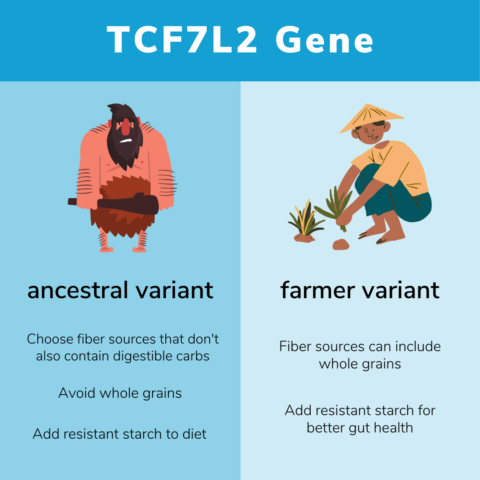
Over the past century, Americans have approximately doubled their sugar consumption. But does this explain the continued rise in obesity and diabetes? Is it really just about eating too much sugar, or is diabetes genetic? Around here, we believe genetics is connected to everything. So, let’s see how.
Introduction To Diabetes And Genetics
Diabetes is a prolific health issue, and a lot of that has to do with the fact that symptoms don’t really become visible until you actually have it. Modern, processed, sugar-loaded foods don’t help much either.
If everyone had the ability to get a free, annual exam that includes blood work, it would go a long way towards prevention. But many places, including the U.S., don’t have that either.
We make it far easier these days to develop diabetes. Of course, you can take all of the normal, preventative measures, like eating healthy and getting exercise. Then, one day you are sitting on the exam table and your doctor tells you that your blood sugar levels are high and you need to make some changes.
Yeah, but! Genetics has a way of sometimes circumventing the usual and giving you a raw deal. But then, sometimes it does the exact opposite, and you eat what you want and you never get diabetes. Genetics is fun like that. Sometimes.
The smart person, however, doesn’t roll the dice with sometimes. We like to hedge our bets and take our chances with the healthy play. That’s learning all we can and making sound choices based on that knowledge. So, is diabetes genetic? Let’s explore more.
Some Facts About Diabetes
You’ve probably heard about the dangers of high blood sugar (glucose). It puts almost 1 in 3 Americans at risk of developing type 2 diabetes [1].
People with prediabetes have up to a 50 percent chance of developing diabetes over the next 5 to 10 years [2].
Among US adults aged 18 years or older, data for 2013–2016 indicated:
- A higher percentage of men (37.4%) than women (29.2%) had prediabetes.
- Prevalence of prediabetes was similar among all racial/ethnic groups and education levels.
- 26.9 million people of all ages—or 8.2% of the US population—had diagnosed diabetes.
- 210,000 children and adolescents younger than age 20 years—or 25 per 10,000 US youths—had diagnosed diabetes. This includes 187,000 with type 1 diabetes.
A LOT of people are at risk. Too many will develop it, most because they didn’t realize they were in danger until it was too late.
For some, a healthy lifestyle will be all they need to avoid it. For others, there are risk factors that go beyond that, and learning about those is key to limiting that risk for diabetes. Genetics may play a role, but we’ll explain more later.
Type 1 vs Type 2 Diabetes
If you have high blood sugar, you are more at risk of getting diabetes. Cut back on the sugar or you’ll become diabetic. You’ve likely heard these things before.
Type 2 diabetes is one of the most prevalent health conditions out there, but it is less an issue of consuming sugar than your body’s ability to process it. Diabetes is a problem with insulin.
Yes, the cotton candy diet would be problematic. In the normal world though, when you consume sugars, it gets turned into glucose, and this is transported around your body to get used for energy or stored for later use. To get used for energy, the glucose has to get into your cells, and that is what insulin is responsible for.
It is up to your pancreas to produce enough insulin to handle the amount of glucose in your blood. Your sugar levels rise and fall based on how well your pancreas functions and how much sugar you consume.
So, what’s the difference between type 1 and type 2 diabetes? Type 1 diabetes is an autoimmune condition in which the immune system attacks the beta cells in the pancreas and destroys the ability to produce insulin. Type 2, which is what 90% of diabetics have, involves how well your body uses the insulin you do produce [3].
From here on out, we’ll be referring to type 2 diabetes, as it’s far and away the most common.
When blood sugar is high, the pancreas releases insulin. It signals the liver and muscles to store the sugar [4, 5]. If insulin stays high for a long time, the body can stop responding to it. This is called insulin resistance [6], and is a great reason to avoid the cotton candy diet and go for something more balanced, like the Mediterranean diet.
Insulin resistance often leads to higher than normal blood sugar levels, or prediabetes. This is difficult to spot due to lack of symptoms, and if you don’t take steps to fix it, prediabetes can develop into type 2 diabetes [7, 6].
So, you can see how an estimate of nearly 1 in 3 people being prediabetic in the U.S. might be a problem. That’s why when it comes to being at risk, it’s important to look at not just diabetes itself, but prediabetes as well.
What Are The Risk Factors For Diabetes?
Diabetes does not occur abruptly. Without regular testing, you can typically have diabetes for years before you notice symptoms enough to get a diagnosis [8]. This is why it’s important to know what the risk factors are so you can determine if you should be getting a blood sugar test sooner rather than later.
These are some of the important risk factors, the first two being the biggest risk factors for prediabetes [7]:
- Obesity
- Lack of exercise
- A diet high in sugar and refined carbs
- Age over 45
- Polycystic ovary syndrome (PCOS)
- Smoking
- Family history of diabetes (genetics)
- Black, Hispanic, Asian, or Native American ethnicity
And because it’s nearly impossible to discuss a particular health issue without it connecting in some way or another to other health issues, we find that diabetes is no different.
People with diabetes are more likely to have one or more of the following, and even more so if socioeconomically disadvantaged [9]:
- High blood pressure (hypertension)
- Depression
- Heart disease
- Asthma
- Chronic kidney disease
- Hypothyroidism
- Chronic obstructive pulmonary disease
A good example of how these problems interact is with depression. The research on depression and diabetes indicates that people are more than twice as likely over random chance to be depressed if they are diabetic [10]. This is confounded by the fact that they also reinforce one another. However, it seems that there is some likely shared mechanism going on in the body that raises this risk for depression and diabetes.
So, it’s important to be aware if you have any of the risk factors and to get your blood sugar tested more often if you do. It’s far easier to avoid diabetes than to manage things once you have it and any potential comorbidities.
There are many things that can influence your risk for diabetes, and genetics can play a role in your blood sugar levels. While you can look out for these factors, knowing where you stand in relation to those factors is just as important, which starts with your DNA.
Is Diabetes Genetic?
Up to 80% of the differences in people’s chances of getting type 2 diabetes can be attributed to genetics.
There are a number of genes that may be involved [11], but one of the more interesting and potentially significant ones is the TCF7L2 gene.
This is one of those genes that is rather two-faced when it comes to diabetes. There is a mutation in this gene, rs7903146, that took hold in humans several thousand years ago due to our own ingenuity.
Before, humans were hunter-gatherers and rarely needed to digest complex carbs. Then, we started farming and consuming more grains. A mutation that served no useful purpose, was now beneficial. The mutation has to do with how we digest complex carbs.
Typically, most complex carbs are digested quickly in the large intestine and turned into glucose. Maybe you’ve been told that consuming more whole grains would limit spikes in blood sugar. But is this true?
If you have the good version of this mutation, meaning the CC or “farmer” genotype, this is very good advice for you based on your genetics [12]. Eating whole grains may help your blood sugar levels.
However, if you have the TC or TT genotype, one of the bad versions from our former hunter-gatherer days, then you don’t process complex carbs very well. Being told to consume whole grains may actually do you more harm than good [13].
If your body can’t process complex carbs, a more beneficial strategy for you would be to consume resistant starches. These starches don’t get broken down in the intestine and make it down to the colon, where they are far more helpful [14].
This is a great example of how knowing how genetics influences diabetes can make a huge difference in your health.
Analyzing Your DNA May Help Curb Your Risk Of High Blood Sugar
Having your DNA analyzed can help you understand what risk factors are relevant to you based on your genes and what you can do to address them.
The SelfDecode Blood Sugar report allows you to optimize your health by uncovering what your genes are doing behind the scenes to affect your odds of struggling with high blood sugar. Not only can your genes influence your likelihood of experiencing high blood sugar, but they also play a role in how well you respond to strategies to help you manage your levels.
Maybe you have that TCF7L2 gene variant that makes it harder for you to process carbs, and adding resistant starch to your diet may be helpful. However, that’s only one gene that can influence blood sugar levels.
There are other ways of how diabetes and genetics are connected. For example, people with a certain ADIPOQ gene variant may have lower levels of a hormone that helps reduce blood sugar. If this is your case, cinnamon may help you manage your levels.
SelfDecode analyzes over one million genetic variants to give your genetic risk score for high blood sugar.
Unlike other DNA companies, SelfDecode goes a step beyond merely highlighting your risk for high blood sugar. Your report also comes with evidence-based diet, supplement, and lifestyle recommendations to help you optimize your ability to limit your risks.
Concluding Remarks About Diabetes And Genetics
Odds are good that you know someone who deals with managing diabetes. They monitor their blood sugar levels, pay strict attention to their diet, and take insulin as needed. It can be difficult to relate to the idea of constantly managing your health or face potentially dire consequences.
Your genetics can teach you a lot about where your strengths and weaknesses lie when it comes to diabetes. Genetic mutations are not all bad. They don’t give you superhuman strength, but sometimes they give you a leg up on the risks for something bad happening. But, you can’t know until you look. You can’t act appropriately until you know.
Diabetes can sneak up on you, and you might not notice your symptoms until it’s too late. Hopefully, now that you know more about diabetes and genetics, it might help you be more proactive about your health. For gene-based recommendations on how to manage your blood sugar levels, you should check out SelfDecode.



